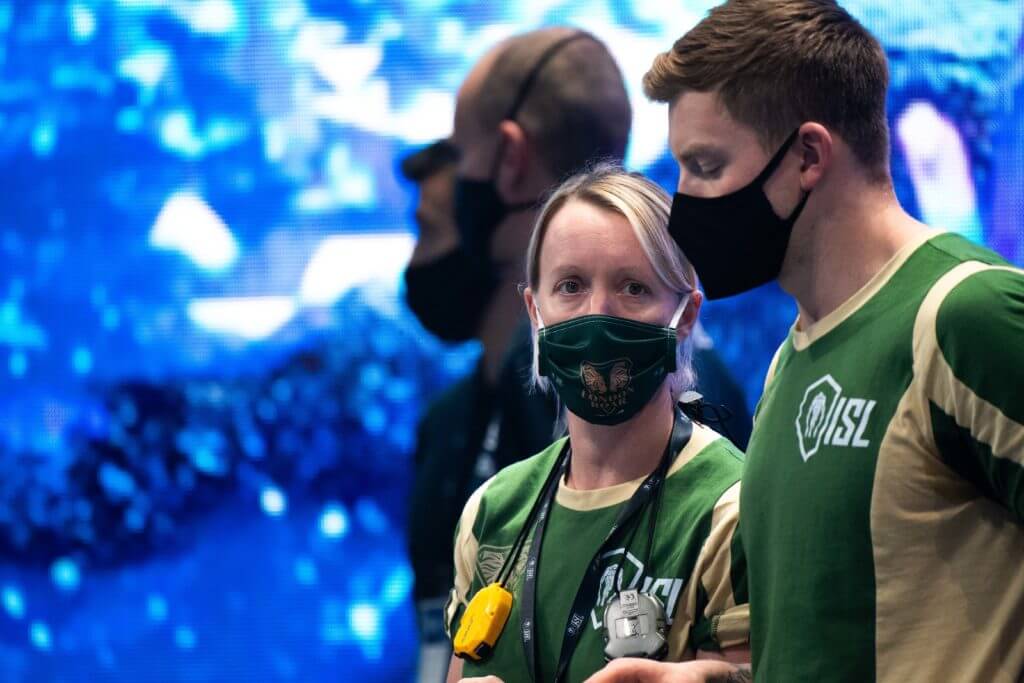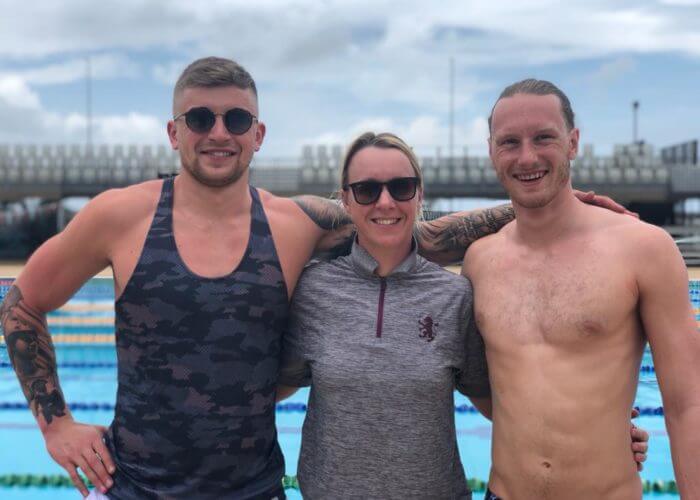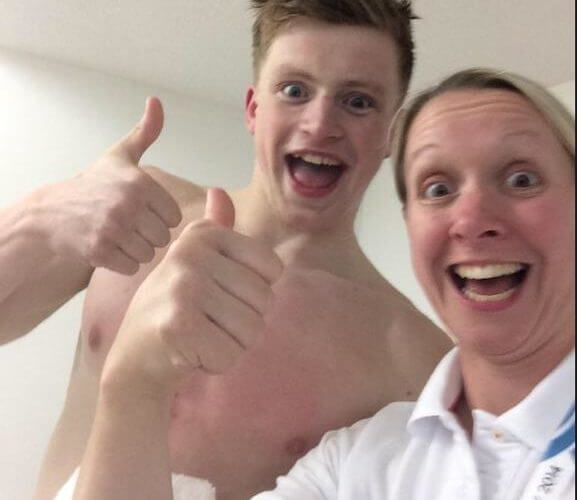Mel Marshall: Tears In Tokyo And Answering Whispers Of Getting Lucky With Peaty

Mel Marshall: Tears In Tokyo And Answering Whispers Of Getting Lucky With Peaty
When Adam Peaty won the 100m breaststroke at the Olympics in July, coach Mel Marshall was up in the stands of the Tokyo Aquatics Centre crying tears of relief.
Peaty had become the first Briton to retain an Olympic swimming title when he added gold in Tokyo to his Rio 2016 crown.
There was also gold in the mixed medley relay and silver in the men’s event but it was after Peaty defended – or in his words attacked – his Olympic crown that the tears flowed.
It wasn’t the first time for Marshall – who has guided Peaty through a timewarp since he was 14 – who had been similarly overcome with emotion in Rio, five years previously.
But this time there were extra layers of emotion given the pressure brought to bear by the pandemic as well as the expectation that sustained success brings.
Marshall told Swimming World:
“I was very tearful after the Adam situation – just because it was a relief. There is only one result for him and that is that he has got to win.
“He wants to win and he wants to do it better than he has ever done it and so there is only one result.
“So to be able to defend that with everything that had gone on – it was just a big relief because you worry about that (kind of) result: they are hard to find, incredibly difficult to get those kind of results.
“I think people just think ‘oh you’ve got him, easy’ but anybody who has ever been up at that level and tried to stay at that level for that long realises there is no easy to that journey at all.
“The thinking is constant, it’s creative and it never stops.
“And when it does stop the results start to stop.”

Adam Peaty, Mel Marshall and Luke Greenbank: Photo Courtesy: Mel Marshall
Not only was it Peaty among Marshall’s group who paid a visit to the Tokyo podium.
Luke Greenbank took bronze in the 200 back and swam the opening leg as GB finished second in the men’s medley relay.
Anna Hopkin anchored the mixed medley relay to gold while also finishing seventh in the 100 free.
For Marshall – who herself swam at the 2004 and 2008 Olympics – there was a sweet satisfaction in light of some asserting that it is easy to find success with the likes of Peaty.
She said:
“It’s the best job in the world: I love that pace and I love that intensity that comes with it.
“It is quite insensitive when people think that I have just got lucky: I take great offence at that.
“If you’ve been on the full breadth of my journey, there was 20% luck but I maximised the luck that I got for sure.
“What was great in the summer in terms of results – I got six medals so it’s not just a fluke – that was a nice thing for me to have that affirmation back for myself.
“I didn’t have to become what sometimes people say and I am really lucky but I have got to deliver medals and I delivered medals and I felt really privileged and proud that I have achieved that.”
Negotiating The Covid Pressures
So too was there the pressure of covid that had brought about the one-year delay of the Olympics and that necessitated social distancing measures as it wreaked its deadly havoc.

Mel Marshall, Adam Peaty, 2014 Commonwealth Games: Photo Courtesy: Mel Marshall
Marshall added:
“Every day was just so dark as in there was no competitions which is what we live for; there was no clear ‘let’s plan this in eight months’ time’.
“It was just one week at a time and try to make the best of a difficult circumstance. I hadn’t coached the group together without one being at one end and one being at the other for 17 months.
“For me it’s all about intimacy and relationships and you just felt like there was this glass shield in the way all the time. So we had to work hard for that.
“I think that we as a staff group really protected the athletes from what was going on and they were just able to do their business.
“Likewise the athletes really were the best version of themselves in the way they prepared: it was structured, they were present in the sessions and there was a real appreciation of what was going on and it was a hard time but we became better people through the challenge I’m sure.”
Adam Peaty Learns Lessons On The Dancefloor
Peaty appeared on BBC’s ‘Strictly Come Dancing’ show following Tokyo.
With partner Katya Jones, the eight-time world champion competed until the sixth week when they got voted out.
It was a move endorsed by Marshall who said:
“Absolutely. I think it’s really important for him to do something different, be challenged in a different way.
“And I thought it would be good for him to do something completely out of his comfort zone and he would have to work hard at it because the pressure was on every week to perform.
“I think there was a lot of learning for him around that and from his brand point of view, it’s a real platform to share what it is that he does and who he is and all that sort of stuff.
“It was a really sensible move from a swimming point of view and a really sensible move from his brand point of view.”

Photo Courtesy: BBC
So too did Peaty’s appearance offer a glimpse into the less appealing side of the media and a society that is eager to pry into someone’s personal life while making judgements based on nothing more substantial than social media ‘observations’.
Marshall said:
“You know what’s interesting? Again and again….how far away from the truth the news is. The embellishments, the negativity and just creating stories and all that stuff just to get interest.
“We must stop that – it’s killing the nation that is.
“It’s just the bullshit wheel.”
Marshall Works On Adam Peaty The Man
Peaty has long been happy to speak out on issues important to him and to show fearless leadership beyond the pool deck.
From backing an athlete’s right to protest at the Olympics to exhorting his fellow swimmers to harness their power and influence for the greater good of the sport, Peaty has become a moral compass.
Marshall said:
“That is one of the things I have tried to work on throughout this cycle.
“When you get the bigger profile people will come at you and you’ve got to be Batman.
“You’ve got to put a bulletproof armour on and you’ve got to know exactly what your moral purpose is, your business purpose and your athletic purpose.
“If you’re in touch with your why, it doesn’t matter what is said about you and who says what.
“It’s irrelevant because the people who matter don’t mind and the people that mind don’t matter.
“It is just about being strong enough to maintain your integrity and be who you are throughout all those challenges that come your way when you’re Olympic champion.”



